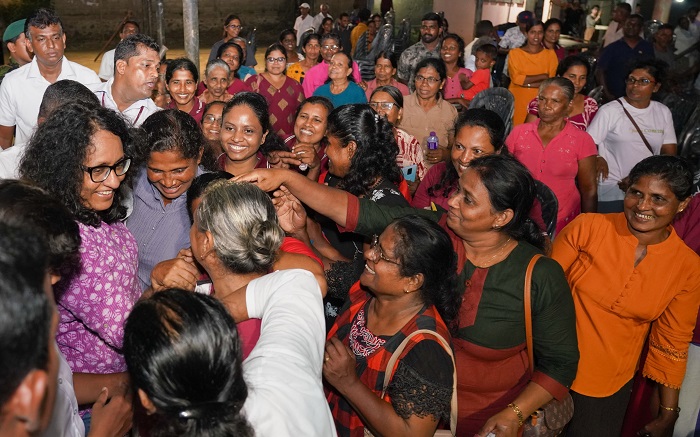-By A Staff Writer

(Lanka-e-News -28.April.2025, 11.10 PM) In a series of public rallies across the Hambantota District yesterday (27th), Prime Minister Dr. Harini Amarasuriya delivered a striking message: the era of political protection for corruption and crime is over. Addressing packed gatherings in Suriyawewa, Hungama, and Tangalle, Dr. Amarasuriya declared that her government had finally removed the political shielding that for fifteen long years allowed wrongdoing to fester within the state.
“We have dismantled the political safetynet that shielded corruption and crime for the past fifteen years,” the Prime Minister stated, drawing resounding applause. "Today, no longer is there sanctuary for criminals and fraudsters under the cloak of politics."
However, Dr. Amarasuriya conceded that not everyone was pleased with these reforms. She pointed out that a "disoriented" faction within the state services — including elements in the public service and the security forces — were struggling to adjust to the new order. "These individuals were nurtured and sustained by political patronage. Now, stripped of that shield, some are desperately clinging to whatever scraps of privilege they can salvage," she said.
One of the most emblematic events of this crackdown, Dr. Amarasuriya noted, was the arrest of former Inspector General of Police, Deshabandu Tennakoon. "When was the last time you heard of a sitting or former IGP being arrested?" she asked the crowd. "Today, Parliament has even appointed a special tripartite committee to investigate."
Indeed, the signal could not have been clearer: in an unprecedented move, those who once basked in the impunity of political blessing now find themselves summoned to account for their actions.
The Prime Minister reserved special scorn for those within her own political sphere who have been caught up in the net. Among them was former Cabinet Minister and erstwhile government strongman Sivanesathurai Chandrakanthan, better known as Pillayan, who was recently taken into custody.
Mocking the narrative spun by loyalists of the former ruling party, Dr. Amarasuriya said: “They tell the public that Pillayan won the war. Yet today, he is being held in connection with the disappearance of a university vice-chancellor. What a joke that is.”
Her tone, cutting and unsparing, underscored a key theme of the day: the battle against impunity must spare no one, regardless of political pedigree.
Turning her attention to local governance, the Prime Minister launched into a blistering critique of the Suriyawewa Pradeshiya Sabha (local council), accusing it of serious mismanagement. She explained that the council had allegedly outsourced market fee collections to third parties — a practice that violates basic tax policy principles.
“If taxes or fees are collected, they must be reinvested into services and facilities for the public," she said. "Instead, we find that tax collection contracts have become a backdoor for misappropriation. Look around: the local market should be gleaming, upgraded to the highest standards. Yet here we are — where did all the money go?"
According to Dr. Amarasuriya, the council's annual revenue reportedly stood at 110 million rupees, yet there was little to show for it in public infrastructure. “Those funds have clearly gone into private pockets,” she said.
Education was another sector the Prime Minister touched upon with evident frustration. Despite government directives, schools continue to impose unofficial collections from students and parents — a practice her administration had expressly forbidden.
"We still receive complaints about illegal school fees," she said. "We will take swift action. The problem is that investigative units in ministries are woefully understaffed. Strengthening those units is one of our urgent priorities."
Dr. Amarasuriya emphasized that the government was allocating a substantial portion of the national budget to village development: improving rural infrastructure, creating local employment opportunities, particularly for women and youth, and ensuring villages are clean and livable.
"We are stabilizing the economy," she said firmly. "Now, we must push toward growth. Toward increasing our national income, not just holding the line."
Commenting on the release of the latest Advanced Level (A-level) examination results, Dr. Amarasuriya extended her congratulations to all students who passed — and offered encouragement to those who did not.
"Some students are already preparing to reattempt the exam, some are seeking vocational training. But sadly, there is a group that has no clear pathway," she noted. "Our educational system has not provided them with viable alternatives. That will change. Starting in 2026, we will implement a new programme that offers every student a clear direction, whether academic, technical, or vocational."
Six months into her government's term, Dr. Amarasuriya admitted that much remains to be done. "We have only just begun," she said. "Correcting years — decades — of rot will not happen overnight. But we are determined. And we are not turning back."
The Hambantota rallies saw strong participation from regional MPs, including Saliya Sandaruwan and Athula Welgoda, as well as a significant number of local government candidates. Their presence symbolized a broader consensus within the new political establishment: that the days of unchecked corruption, administrative mismanagement, and political impunity must end.
Dr. Amarasuriya's campaign to sever the umbilical cord between politics and criminality is ambitious, and in a country as politically entangled as Sri Lanka, dangerous. Every action the government takes against entrenched interests invites resistance — within the bureaucracy, within the military, and within the judiciary.
Yet if the Prime Minister is correct — if Sri Lanka is indeed moving away from a system where political power was a licence to steal — the rewards could be transformational.
Still, her administration must tread carefully. Public enthusiasm for reform is high, but patience is not infinite. Any perception of partiality, of selective enforcement, or of failure to deliver tangible improvements to everyday life, could swiftly turn hope into disillusionment.
For now, though, Dr. Harini Amarasuriya appears to have captured a rare and precious moment in Sri Lankan politics: the promise of real change.
How long she can hold onto it remains to be seen.
-By A Staff Writer
---------------------------
by (2025-04-28 18:31:10)
Leave a Reply